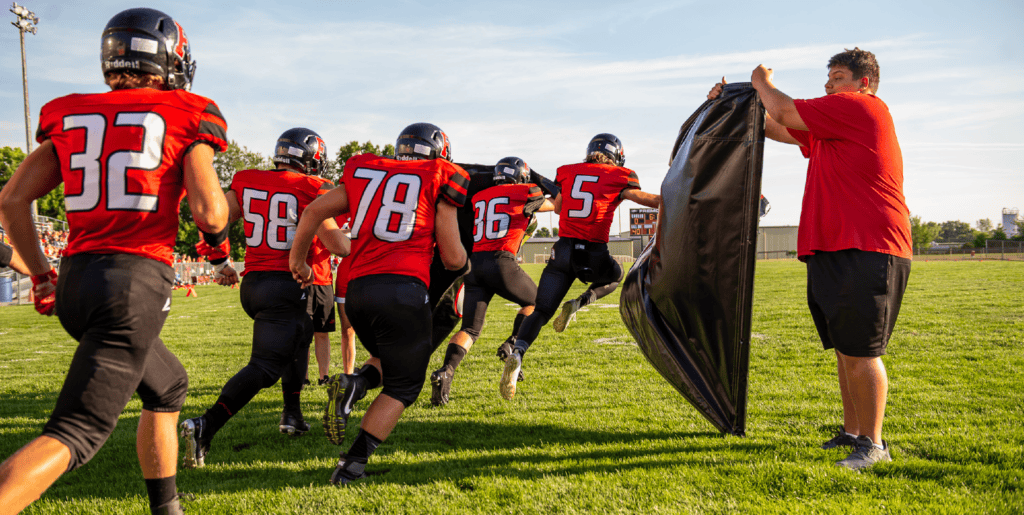PCA Resource zone
Athlete Nutrition Tips for Long Summer Days

For youth athletes, the longest days of the year involve day-long tournaments, two-a-day practices, tough conditioning camps, and generally being out in the heat from sun up to sun down. Follow the tips below to provide your athlete with the proper nutrition to fuel them through summer days.
Staying Hydrated Through Fruits and Veggies
Staying hydrated while playing sports is vital regardless of season, but perhaps doubly important in the summer months. This doesn’t always mean just carrying around a bottle of water (though that’s certainly not a bad habit), but it also means eating foods that help rehydrate before, during, and after playing sports.
Aptly-named, watermelon is perhaps the most obvious food that both nourishes and hydrates. This fruit is over 90% water and has a low sugar content. Grapefruit, strawberries, cantaloupe, grapes, honeydew, oranges, peaches, pears, and pineapple also contain similar amounts of water and are enjoyed by most kids.
Maybe less appealing to a youth athlete’s palette but no less rehydrating are many vegetables such as cucumber, zucchini, and carrots. Throw some combination of these, the aforementioned fruits, ice, and coconut water into a blender and you have one super-hydrating (and tasty) summer beverage.
Saved by Sodium
While too much sodium can have debilitating effects for the average Joe, for competitive athletes it can be the difference between still being able to play hard in the fourth quarter and crashing hard on the bench. For the average American, the USDA recommends an intake of less than 1500-2300 mg of sodium per day, however for an athlete in hot conditions this demand is higher. Insufficient sodium levels can result in cramps, headaches, nausea, and hyponatremia (a low concentration of sodium in the blood).
To combat this intense sodium loss, slightly up the intake of sodium leading up to and during intense summer sport days. This can be done through sources that help fulfill athletes’ other nutritional needs at the same time, such as vegetable juices, soups, whole grain snacks like crackers and pretzels, rice cakes, condiments, prepared or cured meats, and sports drinks.
The Day(s) Before
How an athlete performs during a long day of practice, or games is largely dictated by what they take in the day before. Just as beginning to drink water when you become thirsty likely means you are already dehydrated, waiting until the day of a long summer training session to load up on the necessary macronutrients and calories is already too late.
In addition to drinking water steadily throughout the days prior, serve up a big and balanced meal that has a good balance of protein, fats, and carbs the night before a competition. Some favorites of many competitive and professional athletes are whole-grain pastas with chicken or fish with sweet potatoes and other vegetables. While there is little evidence to support traditional “carbo-loading” as necessary, adequate energy intake is necessary so athletes can recover from previous efforts and replenish muscle glycogen. An athlete who consumes a varied diet and adequate total energy will fully replenish glycogen stores within 24 hours of a workout or game.
Supplements Are No Substitute for Hard Work
Supplements are most often utilized to provide an athlete with an advantage above and beyond what he or she could achieve on their own. With youth sports and school-age athletes, skill acquisition, cognitive development, and physical maturity have far more to do with an athlete’s performance than the effects of any supplement. Strength and speed develop naturally with physical maturity, but skill acquisition and an understanding of teamwork are areas for improvement at any age.
Athletes who hit puberty earlier and reach physical maturity at a younger age frequently become star athletes early on because of their superior size, strength, and speed. However, athletes who focus on skill acquisition, sound training techniques, and smart tactics and strategies fare better in the long run, because eventually everyone catches up in terms of physical maturity. Athletes who rely on supplements may miss out on this valuable skill acquisition period and, although they might see short-term improvements, are likely to see their performance superseded by athletes who developed at a more natural pace.
Figuring out a Plan
Sports nutrition is far from an exact science. Figuring out what works best for your athlete is largely subject to trial and error and tinkering with others’ guidelines and suggestions. There are too many variables in an athlete’s age and physical condition, the weather, duration and type of sporting activity, and the amount of time in between activity for there to be a one-size fits all solution as it pertains to keeping youth athletes fueled during the summer.
If you are the chief meal preparer and/or snack provider to your athlete, learn if they are adequately fueled or not by asking questions about how they felt near the end of a high-activity day. Their answers might let you know what tweaks need to be made to their meals or if special healthy snacks need to be sent with them.
While diet can significantly impact how an athlete feels in the heat, there is no perfect combination of food and fluids that can combat being out in the sun too long.
This resource was developed with True Sport